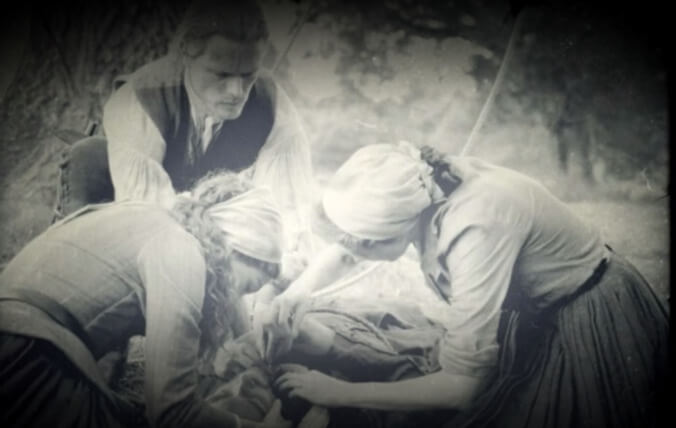Outlander uses silent film to hauntingly explore trauma and grief

“Famous Last Words” deals with the traumatic aftermath of last episode’s haunting final image: Roger hung from a tree. He survives—with significant physical and mental trauma. And to explore this dark story of recovery and PTSD, Outlander breaks from its usual form. It’s a smart and surprising choice. Despite the show’s tendency to take a lot of narrative risks and combine several genres at once, the show has never played with form before quite like it does here. It’s a brilliant choice and one that achieves several things at once, keeping it from feeling like mere gimmick. By interweaving scenes styled like a silent film with its normal scenes, Outlander reinforces the cracks in Roger’s reality and perceptions as he grapples with significant trauma.
The episode opens first with a flashback to Roger and Brianna’s time before in the future. Roger’s teaching his history students about the importance of words—specifically, last words. It’s an effective setup for the themes the episode contemplates but also a stark juxtaposition of Roger’s life before with his life now. In his life before, war and death were mostly things to be studied, concepts to be tilled for philosophical and cultural meaning. He was a professor and a historian, and he lectured on wars. He didn’t fight them. Roger imagines his final words with a heavy dose of fantasy and romance: “I’d say let history forget my name so long as my words and my deeds are remembered by those I love,” he muses for his students, eyes flitting over to Brianna who’s sitting in. Death and war do not allow room for such musings though. His death is brutal and lonely and violent, and there’s no time for final words. It’s all the result of a massive miscommunication, but it’s also the result of war, which Roger finds himself embroiled in in his new life in the past with Brianna.
That contrast between his two lives is palpable. From the warm classroom we next transition hard into Jamie, Claire, and Brianna finding Roger hanged, filmed in the style of a silent film. The dialogue is sparse but urgent, conveying only what is exactly necessary in that utilitarian way that silent films use text. The rest has to be conveyed visually. Throughout the episode, Roger’s PTSD flashbacks take the form of these silent black-and-white images. It’s an effective way to establish just how disorienting and out-of-body these intrusive thoughts are for him. It also allows Outlander to really intimately show horrific images, slightly softening the gore of it. A close-up of Roger’s hands intertwined moments before he’s hanged is instantly stirring and also personal. Another shot shows what Roger sees through his hood. Even as it takes off some of the grisly edge, the silent film style also makes the scenes feel even more visceral, making Roger’s trauma immediately immersive.
Outside of these flashbacks, his hurt is palpable, too. His relationship with Brianna is fractured. She doesn’t quite understand why he won’t even try to talk or why he still struggles mentally even when he’s doing physically well according to Claire. Brianna has experienced her own traumas, but there’s still a rift between them, and while the relationship writing when it comes to these characters has been wobbly, it’s nuanced and intricate in “Famous Last Words” in ways that ring true. Brianna sings to Jemmy, and it’s meant to be a sweet moment, but just off to the side, Roger weeps, knowing he won’t sing to his son like he did before. The use of contrast and juxtaposition in the episode is exquisite, burrowing into ideas of how trauma splits the self. One of the more devastating instances of the silent film interruptions happens when Roger tries to play the ukulele. Music used to be a passion of his, but now even that can’t provide escape. Roger feels trapped, alone, depressed, and all of these deep, affective emotions are expertly embedded in these scenes. The acting and direction are both at their finest. Slow fades throughout the episode lend a somber feeling.
 Keep scrolling for more great stories.
Keep scrolling for more great stories.
